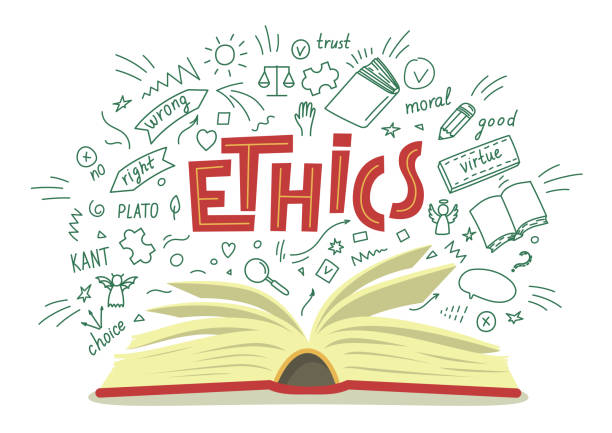
Ethics. Open book with moral philosophy hand drawn doodles and lettering on white background. Education vector illustration.
Writing a dissertation is one of the most important academic milestones for graduate and postgraduate students. Whether you’re tackling a scientific study or engaged in management dissertation writing, it’s crucial to go beyond the basics of research design, data collection, and analysis. One essential element that must never be overlooked is ethical considerations in dissertation writing research. Ethical issues not only influence the credibility of your work but also protect participants, ensure academic integrity, and uphold professional standards.
In this blog post, we explore the core ethical considerations students must follow, how to navigate challenges, and where to find the best online help and professional services to support you through this essential process.
Why Ethical Considerations Matter in Dissertation Writing
Every research project involving human participants or sensitive data has ethical implications. Ignoring these can lead to severe consequences, including academic penalties, withdrawal of the dissertation, or even legal action.
Upholding Academic Integrity
At the heart of any dissertation lies the principle of academic honesty. Plagiarism, falsification of data, or misrepresentation of results are serious violations. Proper referencing, accurate reporting, and acknowledging other researchers’ work are vital.
Protecting Participants
Researchers must ensure the safety, privacy, and dignity of participants. This includes obtaining informed consent, ensuring confidentiality, and avoiding any form of coercion or harm. These are foundational to ethical considerations in dissertation writing research.
Key Ethical Considerations in Dissertation Writing Research
Below are the primary areas every student and academic writer should pay close attention to when conducting research for a dissertation.
1. Informed Consent
Participants must be fully informed about the research purpose, how their data will be used, and their right to withdraw. Consent must be voluntary and documented.
2. Confidentiality and Anonymity
Respecting the privacy of participants is essential. Assigning codes or pseudonyms and storing data securely helps maintain anonymity.
3. Avoiding Harm
Your study must not harm participants physically, psychologically, or emotionally. This is particularly important in sensitive topics like health, trauma, or social issues.
4. Data Management and Storage
Data should be stored in encrypted formats and used only for the stated research purpose. Mismanagement can compromise both ethical integrity and academic reputation.
5. Honest and Transparent Reporting
All findings, whether favorable or not, should be reported truthfully. Fabrication of data is a serious breach of ethical and academic conduct.
Online Resources and Services for Ethical Dissertation Writing
When facing the complex requirements of ethical dissertation writing, many students seek online help. It’s important to choose the top professionals and experts who understand not only the structure and content requirements but also the ethical boundaries.
1. Ethical Review Boards (IRB/ERB)
Before starting research, especially with human participants, students often need approval from an Institutional Review Board (IRB). These boards evaluate the ethical soundness of the proposed research methods.
2. Online Academic Support Platforms
Trusted dissertation writing services offer expert guidance on ethics compliance. These platforms have professionals and experts familiar with ethical standards, especially for psychology, medicine, education, and social science research.
3. Supervisor and Committee Support
Your academic supervisor is a valuable source of advice. Always consult them before making methodological or ethical decisions.
How Professionals Help Navigate Ethical Challenges
Even students with the best intentions can unintentionally overlook ethical practices. That’s where professional help services come in. These services guide you through potential pitfalls and ensure that your dissertation maintains high ethical standards.
Expert Review of Your Ethical Approach
Top experts provide a detailed review of your research plan, highlighting any potential ethical red flags and suggesting improvements.
Help with Consent Forms and Participant Information Sheets
Professionals can help you create clear, legally sound consent forms and participant information documents that align with institutional requirements.
Guidance on Data Handling and Reporting
Experts help you implement best practices for data storage, use, and reporting, ensuring that your research complies with both ethical and academic standards.
The Role of Plagiarism Checkers and Writing Tools
Maintaining originality is another pillar of ethical considerations in dissertation writing research. Today’s top online tools and services offer plagiarism detection, citation support, and grammar correction.
Plagiarism Detection Tools
Using services like Turnitin or Grammarly ensures that your writing is original. Even paraphrased content must be properly cited to avoid plagiarism.
Citation and Referencing Tools
Tools such as Zotero, EndNote, and Mendeley make it easier to cite sources correctly. Proper referencing is an ethical and academic requirement.
Common Ethical Dilemmas and How to Solve Them
Ethical issues can be subtle. Here are some common challenges and how the best online services and experts help solve them:
Using Secondary Data Without Proper Permission
Some students use data from previous studies without checking usage rights. Experts help you confirm licenses or guide you in sourcing ethical alternatives.
Incentivizing Participants
Offering compensation must be balanced and should not coerce participation. Professionals can advise you on fair practices in participant compensation.
Reporting Negative Results
There’s a temptation to hide or alter negative results, but doing so breaches ethical norms. Experts remind you that honesty is more valuable than perfection.
The Consequences of Ignoring Ethical Guidelines
Failing to meet ethical standards can result in:
- Rejection of your dissertation
- Academic penalties or expulsion
- Damage to your professional reputation
- Loss of trust from the academic community
Working with ethical experts or using online help services ensures you’re on the right side of these expectations.
Best Practices to Ensure Ethical Dissertation Writing
Here are some tips to ensure your dissertation is ethically sound:
Start Ethics Early
Don’t wait until the research is underway. Ethics should be part of your planning process from the beginning.
Keep Documentation
Maintain thorough records of consent, correspondence, and data handling procedures.
Seek Professional Help When Needed
There’s no shame in asking for help. Top academic professionals offer ethical review services that protect your work and participants.
Final Thoughts
In today’s academic landscape, ethical considerations in dissertation writing research are more important than ever. From protecting participants to avoiding plagiarism, ethics plays a central role in every step of the dissertation journey.
Fortunately, you’re not alone. With the best online help, top experts, and professional services, you can ensure your research is ethically sound, academically respected, and personally rewarding. Remember, a dissertation that’s ethically grounded is one that earns not only grades but also trust and credibility in the scholarly world.





